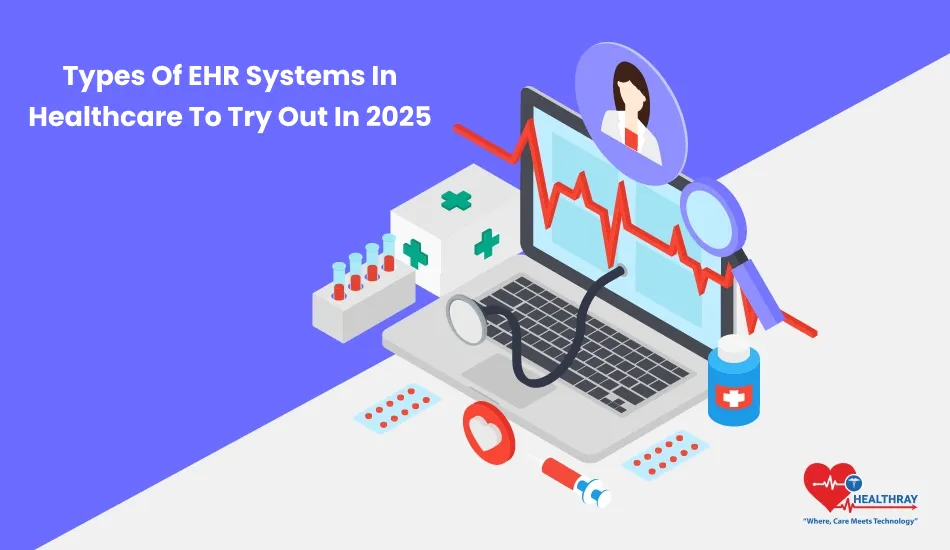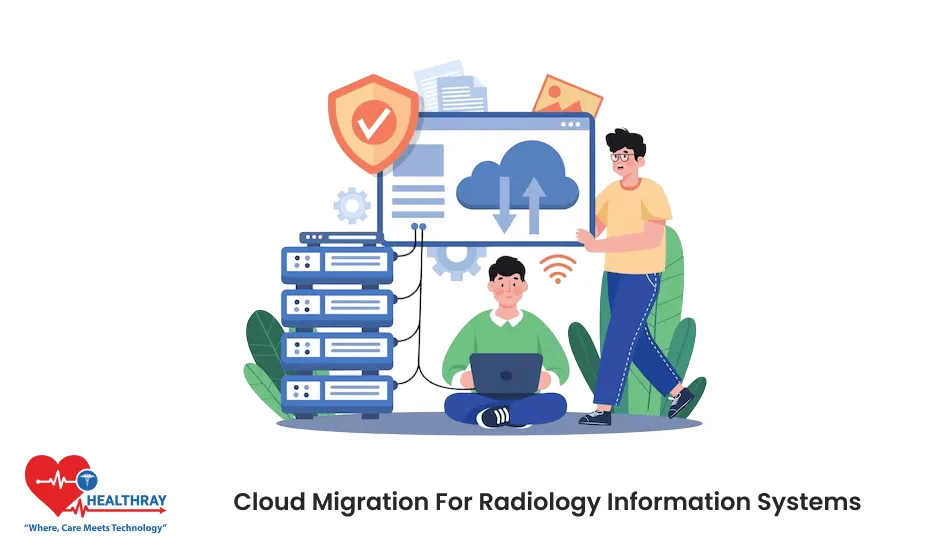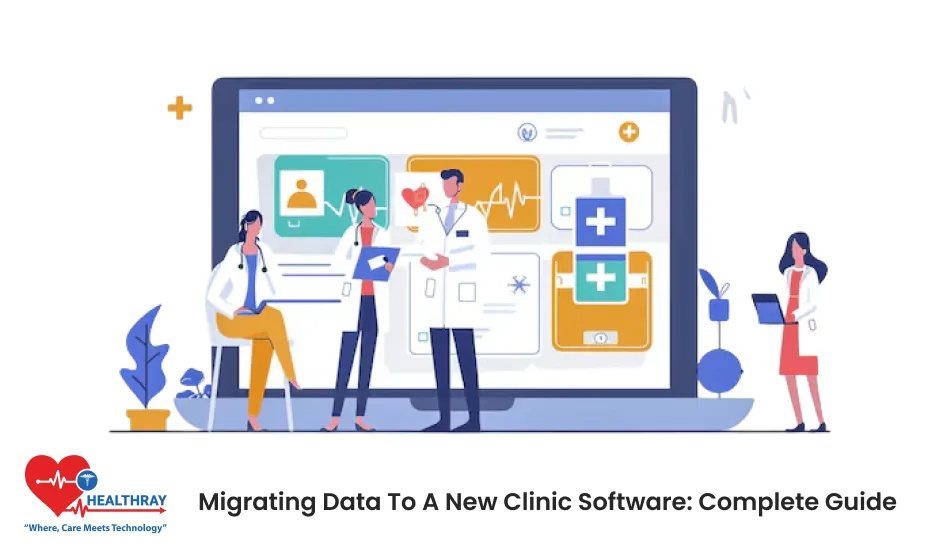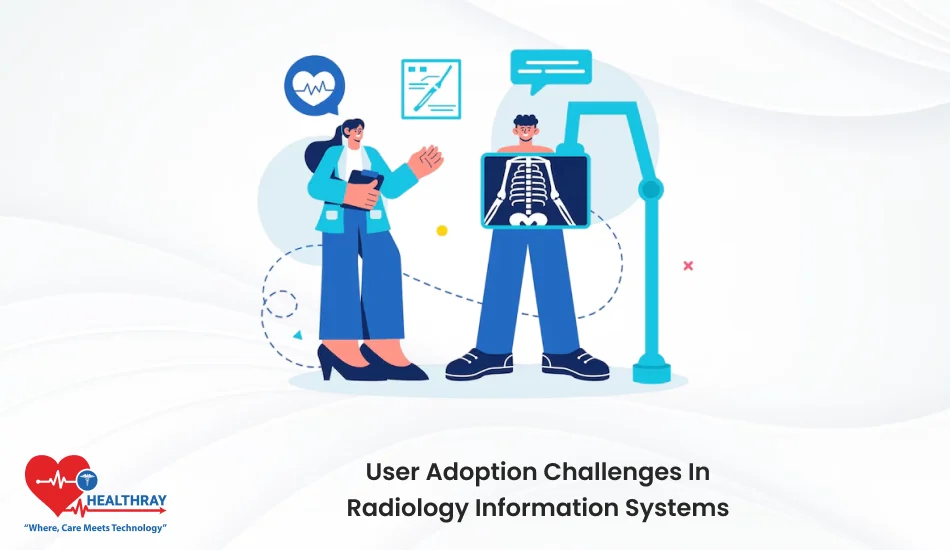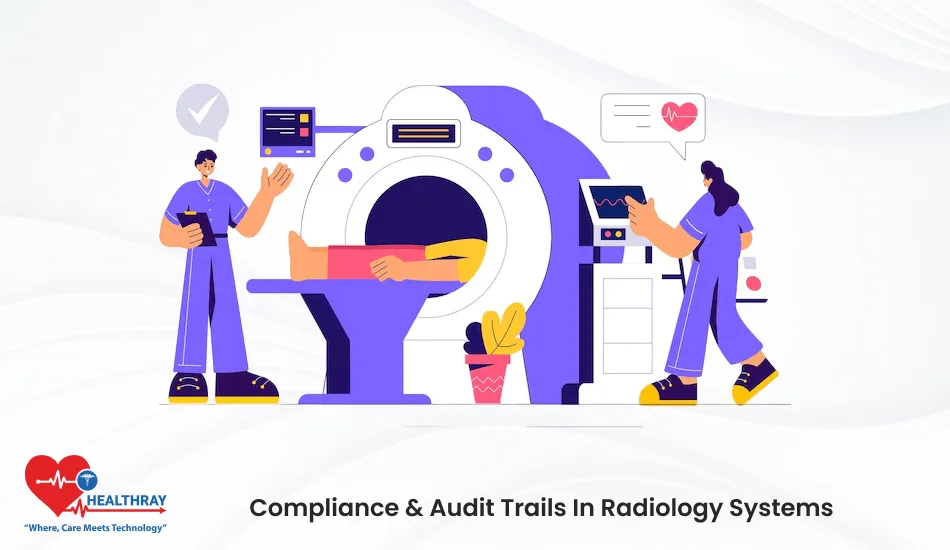Quick Summary
Learn about the newest EHR technologies for 2025, from AI-powered solutions that optimize clinical decisions to cloud-based platforms that improve accessibility. Examine adaptable choices, smooth integrations, and robust security features catered to various healthcare requirements.
Introduction
Electronic Health Records, or EHRs, improve patient care and simplify the operations of medical practices. They all facilitate better note accuracy, more effective administrative work, better patient care, and more profitability.
EHRs lessen the workload associated with administrative duties such as insurance claim processing, appointment scheduling, medical history collection, payment processing, and patient registration. EHRs automate these processes, saving patients and healthcare professionals much time and money.
Some essential EHR features and benefits are also provided by EHR Software in Healthcare, which can help increase practice productivity even more. EHR system in healthcare drives your brain to make better clinical decisions, improve clinical research, and ease to make healthcare payments.
Additionally, it contributes to advance healthcare delivery from patient records to manage inventory. Seamlessly share clinical information from one segment to another with just a single click. Health system maximize productivity, use integrated tools to get better insights, and improve patient medical history.
In the modern medical field, electronic medical records (EMRs) have replaced paper-based records as the primary means of information storage. Thanks to EHRs, doctors and nurses can more readily navigate patient data by combining patients’ electronic medical records and histories into a digital file. The medical industry uses a variety of EHR systems nowadays. Let’s take a look at different types of electronic health record systems in this article.
What is Electronic Health Records?
An essential component of the healthcare sector is electronic health records. The days of utilizing pens and paper to record each patient’s crucial signs are long gone for medical experts. The digital revolution significantly supported the worldwide adoption of EHRs population health, and their advantages by clinics. Currently, the accessible EHR program comes in various shapes, all geared toward streamlining the exchange and storage of medical records.
Doctors may get to checkup records for specific patients, screen patients’ vitals over time, and keep track of crucial data in a crisis, thanks to different EHR system types. EHRs improve accessibility and forms by putting away electronic medical record records on a single computer framework.
This innovation is the brilliant grail for enterprises looking to extend the clinical and budgetary efficacy and efficiency of their offices. Electronic health information amasses clinical data from staff personal details to inventory information. Moreover, it is the best platform for the healthcare industry because it requires less staff to execute hospital activities, efficiently processing data, and effortlessly managing appointments.
Modern practice is possible with the smart electronic health record software. From data correction to amazing visual dashboards, each of the tasks complete smoothly. Support in enhancing practice efficiency, accomplishes goals a lot faster, enhances optimal patient care, and avoids appointment cancellation. Additionally, the EHR software improves document efficiency and reduces clinical errors.
Your clinic must choose the leading EHR solution. The incorrect product can interfere with you even though the suitable one will simplify strategies and help specialists give better care. To give readers a great idea of employment and preferences, we have included an overview of the numerous best EHR software systems currently showcased in this article.
The Health Insurance Portability and Accountability Act (HIPAA) mandates that all medical practitioners submit claims electronically. It has expanded EHR utilization across the country even more.
Which aspects of electronic health records are essential?
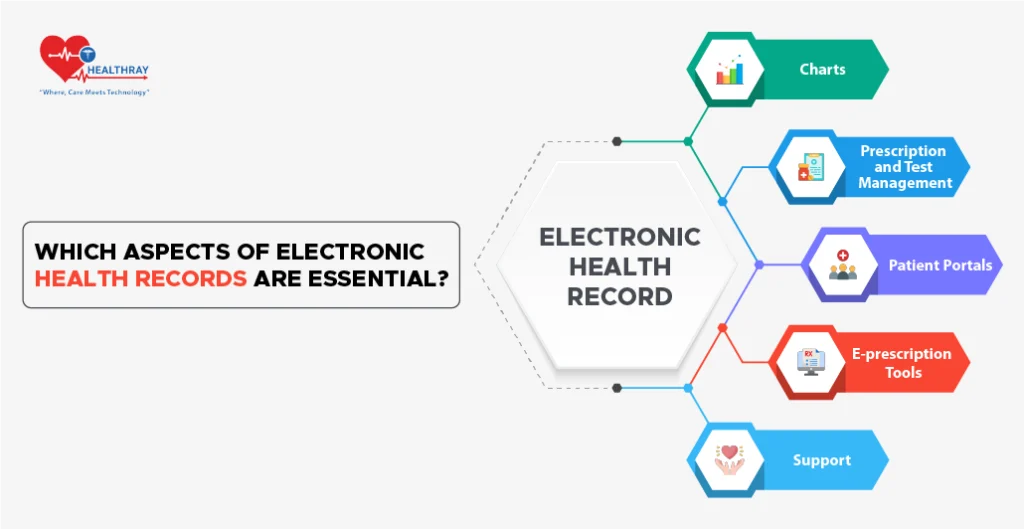
Charts
All EHR software will include a careful record of a patient’s medical history throughout the healthcare system. Analyze, test results, medicine drugs, allergy data, and much more are present in this. All of this data is helpfully consolidating into a single global electronic health records platform. A part of the EHR computer program also lets doctors make individualized templates for each patient. It will make taking customized notes for particular patient visits easier.
Prescription and test management
EHR software will include records about a patient’s past associated with medicines, lab work, and test results. To better understand what works for each patient’s fascinating needs, specialists can have a more profound understanding of the patient’s history with medicines. Eliminating copies and progressing tests and tests’ readability are further benefits.
Patient portals
Patient portals provide clients access to their claim medical records in expansion to other valuable features of the patient portal, including integrated EHR software. To enable patients to take charge of their health, a few patient portals incorporate access to data on medical histories, population well-being reports, and other educational assets. Online scheduling, outlines of past visits, and other valuable data are regularly accessible via understanding portals.
It captures information in a more excellent manner and easily turns into analytical reports, simple to examine and getting conclusions. Moreover, the health information technology stores appointment details, centralizes all healthcare bills, and greater patient communication along with physicians through connected medical systems.
E-prescription tools
An e-prescribing feature is regularly present in most EMR systems for hospitals, empowering specialists to order and oversee medicines electronically. Paper prescriptions are not necessary, therefore this simplifies life for both patients and physicians. The patient won’t have to carry around a paper medicine script since the specialist will electronically send the medicine to their drug specialist.
Create prescriptions very smoothly and implement guidelines correctly. Assimilation of all patients prescriptions in the single healthcare platform. Moreover, the electronic health records system has an auto-fill feature, which simplifies to generate personalized prescriptions. Ease to review a patient medication template from the unified healthcare platform. Therefore, it augments medical services and preserves time.
Support
There are various “decision support” capabilities in EHR software. These apparatuses expect specialists to make more educated choices on their patients’ health by giving them exact health data, medical history, and “best practices.” Each patient gets more secure, and healthcare is way better. For cases, “medication decision support” helps specialists select the fitting drug for each patient based on their needs and medical history.
What benefits do EHR systems offer?
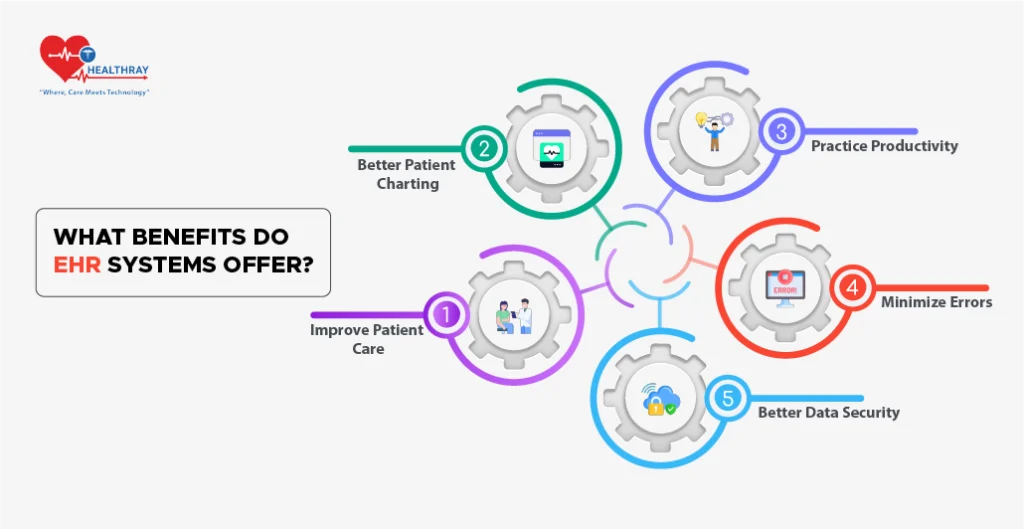
Improve Patient Care
Elevating patient care on various fronts is one of the critical benefits of Electronic Health Records Systems technology.
By offering thorough patient histories, facilitating more precise diagnoses, and customizing treatment regimens, EHRs improve illness management. Moreover by strengthening safety (lowering errors and drug interactions), optimizing care coordination, and adjusting care to each patient’s needs, they raise the standard of care.
Hence through providing patients with simple access to health information, EHRs also support patient education and population health management by empowering them to make knowledgeable decisions about their care. Furthermore, these platforms enhance communication between healthcare professionals by guaranteeing prompt information sharing. The final care given has significantly improved due to all these advancements in various patient care domains.
Better patient charting
EHR frameworks significantly improve healthcare practitioners’ understanding charting. They provide organized templates that make paperwork simple and uniform. Error risk is additionally essentially less by an EHR system’s automatic information entry.
These innovations make real-time upgrades conceivable, ensuring that patient charts are always up to date. Also, they give simpler access to past records, moving forward to benefit continuity.
Practice productivity
Another advantage of EHR innovation is an increase in practice productivity. To begin with, integrated planning systems automate coding and claim administration by straightforwardly connecting appointments to advance notes.
It minimizes blunders medical billing and delays by guaranteeing that appointments are consistently connected to understanding data, progressing medical practice administration and diminishing regulatory strain.
In numerous practices, EHRs encourage communication between healing centers, research facilities, and other specialists. They too make it conceivable for wellbeing insurers to confirm formularies automatically and for lab tests and symptomatic imaging to be requested and sent conveniently.
EHRs also guarantee a prompt reaction to open health issues by advertising connections to open health frameworks like databases and registers for infectious diseases.
These frameworks empower remote access and altogether minimize paperwork and other authoritative assignments and obligations, coming about in a more beneficial, economical, and agreeable healthcare setting that benefits patients and doctors.
EHRs can essentially lower the costs related with regulatory obligations by lessening the sum of time spent on printed material and encouraging speedier and less demanding collaboration on persistent health.
Minimize Errors
The lower rate of medical blunders is one of the most advantages of EHR systems. Much obliged to coordinate security checks, EHR Systems in Healthcare improve exactness and can inform medical experts of almost conceivable issues.
Staff individuals must be more exact with handwritten notes, which might result in regrettable care blunders. At your practice, an EHR can help in dispensing with that issue.
Better data security
Utilizing strong encryption techniques, EHR systems improve information security by avoiding undesirable access to patient data and bringing down the possibility of breaches.
Information integrity is additionally insured by schedule reinforcements and disaster recovery methods, indeed in the case of unexpected catastrophes. Another advantage of EHRs is that they provide review trails to track changes and access, empowering staff responsibility.
Types of Electronic Health Record Systems To Try Out
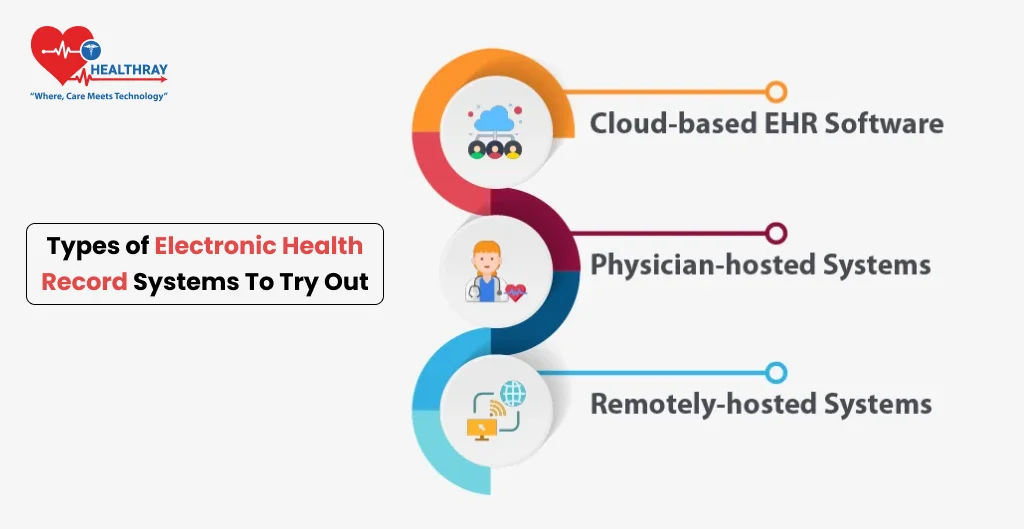
Cloud-based EHR Software
Numerous refer to the twenty-first century as the “age of the cloud.” Appropriately so, one of the greatest advancements of this century has been cloud applications. The medical industry has incorporated cloud innovation into a few applications, including electronic health records, much like each other industry.
Patient information can be put away and gotten online through the internet employing a cloud-based EHR. Clinics can cut overhead costs utilizing cloud-based EHR platforms since third-party merchants manage outside servers, software overhauls, and security.
Patients are not allowed to alter their medical profiles, but they have liberated access to healthcare anywhere. Cloud services are accessible to clinics for a nominal membership fee. Moreover, numerous clinics utilize cloud administrations to grow SaaS capabilities and back-office administrations into a cloud network that patients can access. Clinics can maintain a strategic distance from paying the additional cash that IT masters would need to maintain the on-premise frameworks.
Physician-hosted Systems
It is an application that stores persistent information on the server of either doctor or administration. Physician-hosted solutions, the routine form of EHR programs, can be costly for enterprises since they have to spend money on software and hardware purchases. A clinic must moreover physically introduce the item into a server or computer there.
The essential downtime for this kind of EHR platform is necessary to shut down the foundation and apply updates and patches. You ought to utilize the physician-hosted EHR Systems in Healthcare in the event that you claim a sizable company. Income should be necessary to meet the overhead expenses for the cloud based system and acquiring and supporting the software.
Remotely-Hosted Systems
Instead of the doctor’s server, this application stores patient data on the vendor’s servers. This technology is more advanced than the conventional EHR product and significantly reduces the cost of managing hardware and software. Medium-sized companies with limited funding that wish to save upfront program acquisition fees are typically assisted by ASPs.
Additionally, you can access the system and your data if you are online. Additionally, ASPs handle upgrades and updates, relieving a clinic of this burden. It can be divided into three main categories:
Subsidized: The subsidized, EHR vendor concept is the ultimate grail for small practitioners. In this case, doctors form a partnership with an outside organization that covers the expense of the EHR server. However, the doctor no longer owns the medical data under this paradigm, leading to later ownership problems.
Dedicated: In this scenario, the doctor and the vendor make a deal for the physician to maintain the EHR in a designated place. The doctor knows where the data is present, even if they do not influence it.
Cloud: As was already said, one of the most popular EHR Systems in Healthcare globally is cloud-based. Here, patient data is present on a server the vendor runs, which doctors and medical staff can access around the clock. Clinics can also choose to pay annually or on a monthly basis instead of everything at once.
Does your company require software for electronic health records? Here’s how Healthray can help
Healthray offers customized solutions to optimize healthcare workflows in case your company requires electronic health record (EHR) software. Our intuitive EHR platform has highlights you’ll customize to meet your one of a kind necessities and inclinations. Defending confidential patient data is our need, and we have strong security protocols, counting HIPAA compliance.
Healthray’s seamless integration capabilities ensure interoperability with current systems, allowing for simple transitions and effective operations. Our committed support staff provides thorough guidance and helps optimize your software utilization. It would be ideal if you put your trust in Healthray to utilize our cutting-edge EHR Software Solutions to move forward your company’s efficiency, precision, and patient care.
Conclusion
By 2025, a wide range of EHR Systems in Healthcare solutions will be available in the healthcare industry, each catering to a different set of requirements and preferences. Several options are available, from cloud-based platforms that improve accessibility to AI-powered solutions that transform clinical decision-making. These solutions focus on data security, interoperability, regulatory compliance, and streamlining procedures.
Healthcare providers must choose the best EHR system to maximize patient care and operational effectiveness. By carefully weighing aspects like adaptability, ease of use, and integration potential, adopting the newest EHR technology can help healthcare organizations provide superior, patient-focused care.
